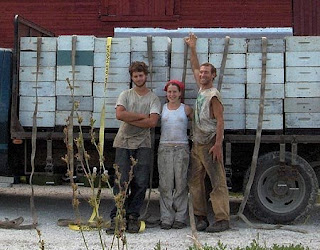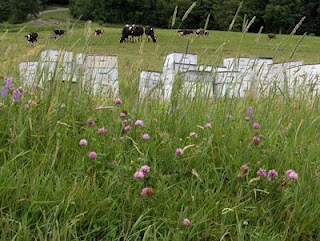The work of harvesting honey is a meditation. Every season we look forward to the physical stresses of gathering honey day after day, and the pushing of physical limits allows the mind to open up. Today I am thinking again about my connection with the beekeepers of over 600 years ago as they celebrated the benevolence of our insect friends and the health of the soil we work with.

with a load of honey
The rich, diverse history of beekeeping inspires our goals for the return of health to honey bees and people. Nothing is more healing than working with the natural progressions of the season. From watching the new hives grow in the spring to the harvest of a bountiful honey crop now, all the work of the year culminates in one vision we are assured of our focus on the natural path of the bees- securing their future and thus our own.
These days the bees are always working before I wake up, and the long days of summer witness foraging on a massive scale. The goldenrod plant, an important late season nectar producer, is ubiquitous in our part of Vermont.
Rounding the corner to a field of the yellow flowers makes my blood quicken in my veins. I never knew I would be so uplifted by looking at a field of flowers, and there you go, I must thank the bees again for augmenting my connection with this bit of sunshine on earth.
The American Apitherapy Society is devoted to research and the use of honey bee products to further good health and to contribute to the improvement of a variety of conditions and diseases. Bee venom therapy has been used successfully in many cases of multiple sclerosis, rheumatoid arthritis, Lyme’s Disease, Epstein-Barr virus, and back pain. The American Apitherapy Society supports the research and use of honey, pollen, propolis, royal jelly and beeswax. Some of our crew from the honey house attended classes at the national conference in Burlington last month, and it has been exciting to be more involved with sharing bee venom therapy with others. For more information on the American Apitherapy Society, see www.apitherapy.org

Over the years, we have enjoyed a long relationship with the Titus family in Charlotte. On the eastern side of Mt. Philo in the Champlain Valley of Vermont, the Titus farm has 54 acres of prime agricultural soil. Almost all of it is in hay crops, and rotational grazing is used for the herd of 100 dairy cows. We are grateful to several generations of this family for their commitment to farming and their willingness to preserve this farmland. The effort to protect this agricultural land forever has been community based with support from the Vermont Land Trust. Our bees have been productive here, and it is reassuring to know that this land will never be developed. Agriculture in this valley is under tremendous pressure with all of the construction of buildings and roads. This is our second bee yard to become part of the Vermont Land Trust, and we encourage you to support the preservation of agricultural land across the country.
We received this propolis spray testimonial from Susan, “Just wanted to share how I’ve used your wound wash/throat spray. After realizing that the cold sore on my lip was healing after a mere two sprays, I treated an open sore on Lambchop’s back, she’s my friend’s mini-poodle. The rawness is gone and the dog is less jittery when we touch her in that area after one treatment. I’ll hit the spot again today before I leave.”
Thank you for your interest in and support of the work of our bees and plant medicine.